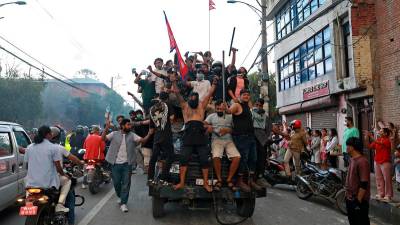KATHMANDU: Nepal’s youth-led unrest stems from deep-seated economic frustrations and political disillusionment with an ageing ruling class perceived as disconnected from public needs.
Digital-savvy but unemployed young Nepalis reached breaking point this week amid limited opportunities and widespread government corruption.
Street protests erupted on Monday after authorities temporarily banned social media platforms, leaving at least 19 dead as police attempted to suppress demonstrations.
Prime Minister KP Sharma Oli’s resignation failed to calm tensions, with protesters burning parliament and multiple government buildings.
The social media prohibition merely ignited existing anger over systemic issues including political instability and slow economic development.
Nepal’s economy relies heavily on remittances, which accounted for one third of GDP last year and represent the fourth-highest dependency rate globally.
The World Bank notes a staggering 82% of Nepal’s workforce operates in informal employment, significantly exceeding global and regional averages.
This remittance dependence has not created quality domestic jobs, perpetuating a cycle of lost opportunities and continued emigration for employment.
Approximately 500,000 young people join Nepal’s workforce annually, intensifying pressure for job creation that supports sustainable development.
Nepal categorises youth as aged 16-40, representing nearly 43% of its 30 million population or over 12 million people.
Corruption remains rampant, with Transparency International ranking Nepal 107th out of 180 countries globally.
Social media has exposed ruling elite excesses through viral videos contrasting ordinary struggles with politicians’ children flaunting luxury lifestyles.
Public dissatisfaction focuses on leaders who have held power for decades since Nepal became a federal republic in 2008.
The National Human Rights Commission condemned the social media ban as undermining democratic governance principles.
Digital rights advocates warned the prohibition created a dangerous precedent despite its subsequent reversal.
Protesters targeted media institutions including the Kathmandu Post, whose offices were set ablaze on Tuesday.
Young Nepalis use social platforms to express frustrations, maintain connections and engage with global developments.
Their anger reflects broader discontent with inadequate health and education systems alongside rampant corruption and nepotism. – AFP
